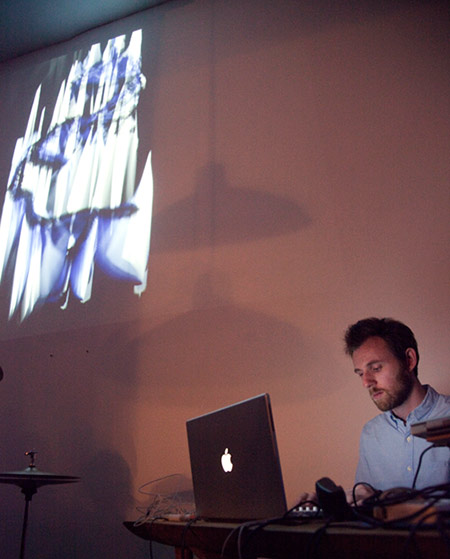Our guest contributor Ezekiel Honig is a composer of ambient music, a sound artist and designer, an electronic music producer, and founded the music labels Anticipate and Microcosm. He recently scored music for the film “Florent: Queen of the Meat Market” (2010). Last month Zeke performed at “Happy Oasis” a show that I produced, proved to be a smooth and yielding experience to work with a truly professional music artist. As we’ve been exchanging thoughts and philosophizing on art, music and life, I invited him to write a column focusing on just that–music. In the following words Zeke amplifies his thoughts and different takes as a music artist on the definition of “Genre.”
I think about genre all the time. To be more specific, musical genre in music which is difficult to categorize, that falls between certain margins. As someone who produces material that is in this landscape, but perhaps more so as someone who runs a music label, I’m always looking to frame an artist’s work, to give it the context it needs to relate to something which already exists, and the distance it needs from that thing in order to be original. This is the constant tension experienced by artists (of all kinds) and one could easily argue, of humanity as a whole. We want to be connected to something larger than ourselves but also uniquely individual. In this way, musical genre is a scaled-down version of a principle that runs a thread through everything, but that is perhaps a larger discussion.
So where does music fall in this balancing act? Where does genre help and where does it hurt? Should it serve some basic functions and then be left alone, or is it something stronger that needs to be lauded over and nurtured, or simply re-translated, with people paying homage to a concept and institution larger than themselves? To put it quite simply, I would say yes. Yes to all those paths and the multitude of less severe ones in between. There’s no actual answer, which is good, because it means these topics are in flux, never standing still, always developing…as they should be.
The Balancing Act of History
A genre is at its best as something which grew on its own out of customs of producing music, passing ideas and experience along the way. It’s important to remember the historical counterpart, a lineage which allows musicians to build on what each previous generation has done, to progress (or at least change) what was happening, rather than needing to go back to the beginning without learning from the mistakes and experience of the past. Everyone is getting a head-start because of everyone who came before, which gives us all a means of referencing influences in order to position and understand current work in a different way. Regardless of one’s time in history, originality is extremely difficult, but where genre has taken a movement in sound can be a stepping stone, a base from which to act and a healthy set of limitations, if one chooses to traffic in them.
I speak about this from my own experience of acknowledging my influences and looking for more, to help shade the original ones. I’m always thinking in terms of broad connections like house, dub, techno, ambient, because those are categories which have tropes built into them now, and one can quickly hint towards that without going too far down the path of defining the material as being that thing, or easily go all the way down that path if it’s the goal. Genre can be used to color something without covering it entirely, like applying a cultural footnote without explicitly saying so.
The Club Definition
In electronic music, different forms of dance music (or club music, or however you refer to it) control the conversation because they are such ingrained genres and even when something is clearly not meant for the function of dance music, it needs to often define itself by the degree to which it doesn’t do that, which in and of itself is kind of an odd concept. The function of dance music is interesting though. If people are dancing then it’s doing what it’s supposed to do. It’s almost like comedy. If people laugh, it’s working, though there will always be a level of criticism that may demand it makes one dance (or laugh) in a specific way, with a specific thought in mind. Once these basic standards are established there is room to build. When there is a function involved genre becomes even more essential because it lets you experiment within the confines, or stretch what the confines mean. That’s my favorite place, where something is new but has the subtext of, “by the way, this is also techno, sort of.”
This constant tension exists for concepts themselves. Though many may disagree with this statement, I think that – at least at this point in musical history – once a genre becomes codified and the list of what makes it the thing which it is becomes a known quantity, it begins to die. It becomes too easy to copy and homogenize and has little else to offer, removing the initial excitement of this new discovery. Simultaneously, if someone doesn’t know what to call something it makes them less likely to talk about it with their friends (which isn’t to say they won’t, but it requires more creative conversation). Words actually mean things even if they mean different things to different people. There are exceptions, where something seems new and trendy and coming out of nowhere, but is actually rooted in some long-standing forms and emotions (i.e. disco, house, hip hop), which is what allows it to keep developing and spawning off new genres with further and further subdivisions. If it has a deep base that it stands on it has an easier time jumping off, knowing where it’s tethered to the past, acknowledging that it can only stray so far. Once it becomes unique enough to be a new sub-genre unto itself with a tidy name to describe it, it begins the process of its own dismantling.


 RSS
RSS
